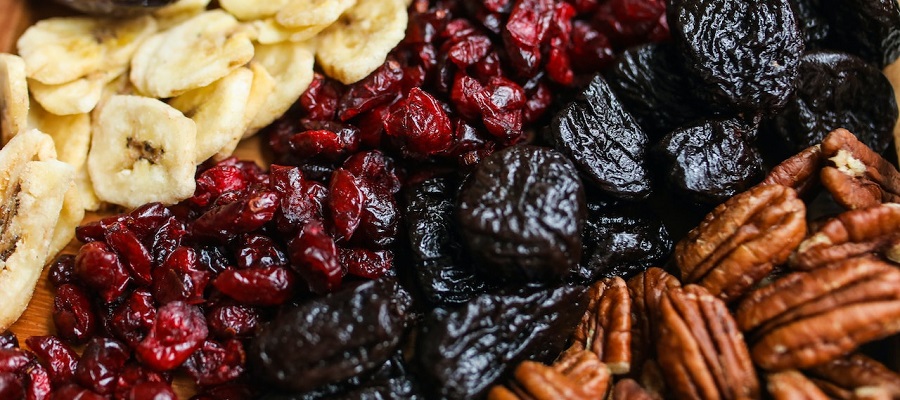Dried fruits are fruits that have had most of their water content removed through drying methods, such as sun-drying or dehydrating. Drying fruit concentrates the natural sugars and flavors of the fruit, making them a sweet and portable snack.
There are many different types of dried fruits, including raisins, currants, apricots, apples, pineapples, mangoes, and more. Dried fruits can be eaten on their own as a snack, or used in cooking and baking, such as in breads, cakes, and granolas.
Some of the health benefits of dried fruits include:
- Dried fruits are high in fiber, which can help with digestion and may lower the risk of certain diseases.
- Dried fruits are a good source of antioxidants, which can help protect cells from damage caused by free radicals.
- Dried fruits are convenient and portable, making them a good snack option when on the go.
However, it's important to note that dried fruits are also high in natural sugars, so it's best to consume them in moderation as part of a balanced diet. It's also a good idea to check the label before purchasing dried fruit, as some brands may add sugar or other sweeteners to the fruit during the drying process.
How is it dried?
There are several methods that can be used to dry fruit, including sun-drying, dehydrating, and freeze-drying.
Sun-drying is a traditional method of drying fruit that has been used for centuries. To sun-dry fruit, the fruit is sliced and placed in a single layer on a rack or tray in direct sunlight. The fruit is left to dry for several days, or until it has reached the desired level of dryness. Sun-dried fruit has a chewy texture and a sweet, intense flavor.
Dehydrating is another common method of drying fruit. To dehydrate fruit, the fruit is sliced and placed on a tray in a dehydrator or in an oven set to a low temperature (usually around 140-160 degrees Fahrenheit). The fruit is left to dry for several hours or until it has reached the desired level of dryness. Dehydrated fruit has a chewy or crispy texture and a concentrated flavor.
Freeze-drying is a more modern method of drying fruit that preserves the fruit's original shape, color, and nutritional content. To freeze-dry fruit, the fruit is first frozen, then placed in a vacuum chamber. The chamber is then heated to a temperature that causes the fruit's water content to sublimate (go directly from a solid to a gas). The water vapor is then removed from the chamber, leaving behind the dried fruit. Freeze-dried fruit has a crispy, light texture and a flavor similar to fresh fruit.
What brands sell these?
There are many brands that sell dried fruit, and the specific brands available will depend on your location. Some popular brands that sell dried fruit include:
-
Sun-Maid: Sun-Maid is a California-based company that has been producing raisins and other dried fruits for over 100 years.
-
Ocean Spray: Ocean Spray is a cooperative of cranberry farmers that produces a wide variety of dried cranberry products, including cranberry-based snacks, cereals, and trail mixes.
-
Dole: Dole is a global fruit and vegetable company that sells a variety of dried fruit products, including dried pineapple, mango, and mixed fruit.
-
Sunkist: Sunkist is a cooperative of citrus growers that sells a variety of dried citrus products, including dried orange and lemon peel.
-
Nature's Garden: Nature's Garden is a company that sells a variety of dried fruit products, including mixed fruit, tropical fruit, and fruit-and-nut blends.
It's also worth noting that many grocery store chains and natural food stores have their own store-brand dried fruit products. These products may be less expensive than the brand-name options, but they may also vary in quality.
Why do we buy dried fruits and are they harmful?
There are several reasons why people buy dried fruit:
-
Convenience: Dried fruit is a convenient and portable snack that can be easily taken on the go.
-
Long shelf life: Dried fruit has a longer shelf life than fresh fruit, as the drying process removes most of the water content that can cause spoilage.
-
Flavor and texture: Dried fruit has a concentrated flavor and a chewy or crispy texture that some people find appealing.
-
Nutritional value: Dried fruit is a good source of fiber and antioxidants, and can be a healthy addition to a balanced diet.
In general, dried fruit is not harmful when consumed in moderation as part of a balanced diet. However, it's important to note that dried fruit is high in natural sugars, so it's best to consume it in moderation. It's also a good idea to check the label before purchasing dried fruit, as some brands may add sugar or other sweeteners to the fruit during the drying process.
Additionally, some people may be allergic to certain types of dried fruit, such as dried apricots or dried apples. If you are allergic to a particular type of fruit, it's important to avoid consuming it.


